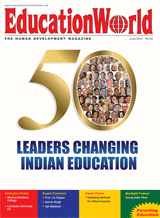 Congratulations on the informative cover story featuring 50 leaders from different walks of life working relentlessly towards changing Indian education (EW June). Their biographies are an inspiration for all principals and teachers.
Congratulations on the informative cover story featuring 50 leaders from different walks of life working relentlessly towards changing Indian education (EW June). Their biographies are an inspiration for all principals and teachers.
I am especially pleased that you have included our dynamic chairman Dr. Augustine Pinto, and managing director Mme Grace Pinto in your list of education leaders. In all the Ryan International Group of Institutions which comprise 128 schools countrywide, their philosophy of education based on 12 tenets viz, academics, environment, sports, music, art, culture, heritage, communication skills, health, human resources management, finance, media, foundation and leadership, is practiced.
The Indian Model United Nations, International Children’s Festival of Performing Arts, community outreach, environmental sustainability programmes, NASA visits, Presidential Classrooms etc are a few of the co-curricular platforms for students to express their talents and abilities.
Arti Bahadur
Vice-principal, Ryan International School
Vasant Kunj, Delhi
Appreciative but strange
It’s always a pleasure to receive a fresh issue of EducationWorld as it brings so much news from around the country. I don’t always agree with the magazine’s point of view, but I seldom feel unpleasantly surprised the way I feel today, after seeing the write-up on me in your latest issue (EW June cover story). I have no idea how your staff acquired the impression that I “put in my papers after getting disillusioned”.
This is a remarkable instance of baseless and misleading information. There was never any question of my wanting a second term. As a teacher I wanted to return to my university after completing my five-year contract with NCERT. Long before this period was to end on September 5, 2009, I had conveyed my intention to the Union HRD ministry, requesting it to set in motion the process for the search of my successor. As it often happens in our system, the process was not initiated in time and I was requested to stay on till a successor was found. I accepted the request and agreed to carry on for a period of six months. When this period ended on March 5, 2010, I returned to my university even though a successor had still not been identified. There was no question of any disillusionment or disappointment.
I also feel unhappy with the following statement: “…he conceptualised and wrote the National Curriculum Framework for School Education (NCFSE, 2005)”. I thought you must be aware, and I can recall your magazine mentioning on an earlier occasion, that NCF-2005 was drafted through a process of an extremely large-scale social deliberation in which more than 3,000 experts, teachers, representatives of non-government organisations, parents and students participated. As many as 21 National Focus Groups contributed different insights and parts of the text that was ultimately welded together in the NCF document by the National Steering Committee chaired by Professor Yash Pal. To say that I wrote this document is not only false but also ignores and trivialises the massive collective effort and spirit that went into its making.
I wonder whether the source material for your rather strange though appreciative write-up on me was also found on the internet. I wish your staff had crosschecked the content with me.
Prof. Krishna Kumar
Delhi University
The points raised by Dr. Krishna Kumar are entirely valid. We regret our speculation and errors — Editor
Wonderful coverage
Thank you for the wonderful coverage of Dr. Augustine Pinto, chairman and Mme Grace Pinto, managing director, Ryan Group, in your esteemed magazine (EW June). We feel deeply honoured that they’ve been listed among the top 50 leaders striving to meaningfully change Indian education.
We congratulate you for your innovative story which, we are sure, will inspire others to bring about positive changes to the education system not only in India but globally as well.
Sudha Singh
Principal, Ryan International School, Greater Noida
Miserable failure
I read the Expert Comment essay written by J.S. Rajput (EW June) with great interest. It is not a misconception that the Indian education system has touched an all-time nadir. The Right to Education Act seems to be failing miserably with the government of India having no pulse of the real situation.
The prime need is to focus on basic and elementary education for India’s neglected rural population.
Pramod Singh
Crossbill Publishing Co
New Delhi
Budget schools target
Your extensively researched, in-depth cover story on the Supreme Court giving the go-ahead to the RTE Act and in particular its directive to private schools to reserve 25 percent seats for poor neighbourhood children, is extremely revealing and educative (EW May).
The vital point which you have done well to highlight is that children from poor households who attend small, private budget schools are the ones who will suffer most. Notoriously corrupt block education officers and government officials will use the RTE Act to harass budget private schools for bribes by threatening them with closure. This will further reduce the already scant opportunities for poor slum and village children to access half-decent primary education.
The Central and state governments have made a complete mess of public education, and now through the RTE Act they want to ruin private school education. The obvious solution is for government to get out of education.
Nandini Deshpande
Mumbai























